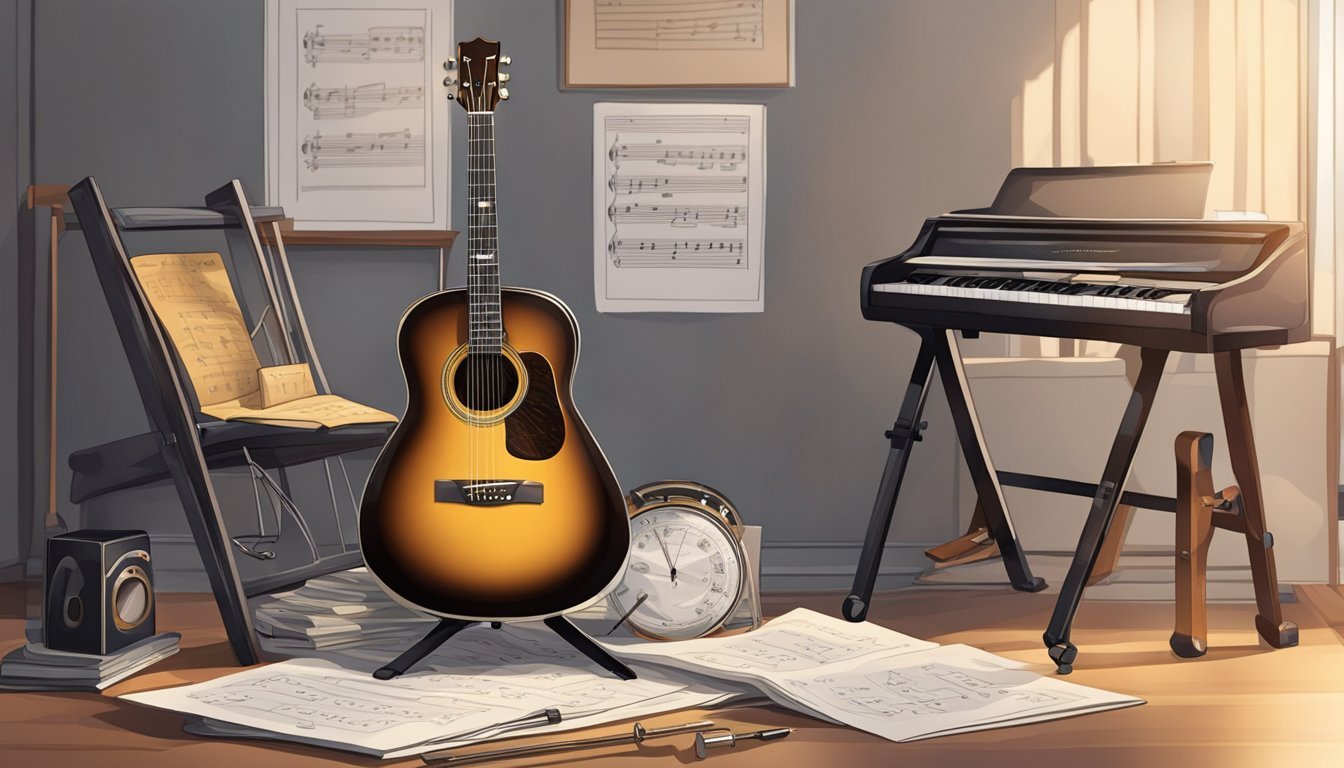Many people wonder about learning to play the guitar.
For most beginners, getting started with basic chords and strumming patterns is fairly easy.
You might be surprised at how quickly you can play simple songs and impress your friends.
It’s all about finding the right approach that works for you.

With the countless resources available today, choosing the right guitar and learning the basics has never been easier.
You don’t need any prior music knowledge to start playing.
Just a bit of dedication and practice will take you a long way.
As you progress, developing your skills can be exciting and fulfilling, whether you want to play for fun or aim for more advanced techniques.
Choosing Your Guitar
Learning about the different types of guitars, brands, and essential accessories is crucial.
Here’s what you need to consider.
Acoustic Vs. Electric
When deciding between an acoustic or electric guitar, think about your music preferences.
-
Acoustic guitars are great for beginners. They are easy to pick up and play without needing extra equipment. The sound is natural and perfect for activities like camping or casual jam sessions.
-
Electric guitars offer versatility. You get to experiment with different sounds and effects. However, you will need an amplifier and more accessories to get started.
Consider how you want to play.
If you’re into strumming chords and enjoying a simpler setup, an acoustic guitar might be your best bet.
If you dream of rocking out with effects, go for electric.
Understanding Guitar Brands and Quality
Not all guitars are created equal.
The brand and quality can make a big difference.
Well-known brands like Fender, Gibson, and Yamaha often produce high-quality instruments.
When you’re looking for a beginner guitar, don’t just focus on price.
Check for good reviews and solid craftsmanship.
It’s wise to try a few guitars in a store to see which feels right in your hands.
Look for features like:
- Solid top for better sound quality.
- Comfortable neck for easier playability.
- Affordable price that fits your budget.
Getting the right quality can motivate you and help your learning progress.
Guitar Accessories Essentials
Starting with the right accessories makes your practice smoother.
Here are some essentials you should consider:
-
Guitar picks: These help you control your strumming and picking. Try different thicknesses to find what feels best.
-
Guitar strap: This is important for comfortable playing, especially for electric guitars. It helps you hold the guitar while standing.
-
Guitar tuner: Staying in tune is essential. A clip-on tuner is easy to use and helps you develop your ear.
Having the right accessories can make your guitar learning experience much more enjoyable.
Don’t neglect these tools as you choose your guitar and start playing.
Learning the Basics
Getting started with guitar is all about mastering the essentials.
You need to familiarize yourself with your instrument, learn some basic chords, and start playing simple songs.
This foundation will help you build confidence and skill as you progress.
Getting to Know Your Guitar
First, understand the parts of the guitar.
Key parts include the body, neck, strings, frets, and tuning pegs.
Each part plays an important role in how the guitar sounds and how you play.
Next, learn how to tune your guitar.
A well-tuned guitar is crucial for making music.
You can use an electronic tuner, a tuning app, or tune it by ear.
Once tuned, hold the guitar correctly.
Your posture affects your playability.
Keep your back straight and position the guitar comfortably against your body.
This makes it easier to reach the strings and frets.
Mastering Basic Chords and Strumming
Start with basic chords.
Major and minor open chords, often called cowboy chords, are essential for beginners.
Focus on chords like G, C, D, E, and A. These chords form the basis for many popular songs.
Practice transitioning between these chords smoothly.
Use charts to help memorize finger placement.
Strumming techniques are equally important.
You can strum using your fingers or a pick.
Experiment with downstrokes and upstrokes.
Try to maintain a steady rhythm.
Start slow and build up speed as you gain confidence.
Starting with Easy Songs
Once you know some chords, it’s time to play easy guitar songs.
Choose songs that rely on the basic chords you’ve learned.
Look for popular tracks by artists like Ed Sheeran or simple classics.
These often use just a few chords, making it easier for you to play along.
Playing recognizable tunes helps you stay motivated.
You can find many guitar songs for beginners online.
Follow the chord progressions carefully.
As you practice, you’ll get better at switching chords and strumming.
This will enhance your overall guitar skills.
Additionally, focus on developing a consistent rhythm and timing while playing.
This will not only improve your chord transitions but also make your music sound more polished.
By dedicating time to these fundamentals, you can learn guitar quickly and effectively, allowing you to progress and enjoy making music sooner.
Developing Your Skills

Building your guitar skills involves creating a solid practice routine, exploring different music styles, and learning to play by ear.
Focusing on these areas will help you progress and enjoy making music more.
Implementing Practice Routines
Setting up a practice routine is key to developing your guitar skills.
Decide how often and when you will practice.
Aim for at least 30 minutes a day to build consistency.
Start with basic exercises, including chord progressions and strumming patterns.
Work on your rhythm guitar skills by playing along with a metronome.
This will improve your timing and feel.
Aim to learn a couple of easy guitar songs each week.
This keeps practice fun and helps you apply new techniques.
As you get comfortable, add in a few minutes for scales and guitar solos to challenge yourself further.
Branching into Different Genres
Trying out different genres will make your guitar playing more interesting.
Explore styles like blues guitar, rock, or folk to find what you enjoy most.
Each genre has unique elements that can enhance your skills.
For example, blues often emphasizes specific chord progressions and expressive solos.
Playing blues can improve your improvisation and lead guitar skills.
Check out classic blues songs to get inspiration.
Don’t hesitate to jump into something unfamiliar.
You might be surprised at what styles you enjoy and how much they can teach you!
Learning to Play by Ear
Training your ear is an important skill for any guitarist.
Start by listening to your favorite songs and trying to pick out the chords.
This will improve your ability to figure out music without sheet music.
Begin with simple melodies or easy guitar songs.
As you progress, challenge yourself with more complex tunes.
Playing by ear can also help you understand strumming patterns and rhythm guitar more deeply.
It’s okay to miss notes along the way.
Each attempt gets you closer to friendly jam sessions where you can show off your skills!
Finding Resources and Lessons
When learning guitar, finding the right resources can make a big difference.
There are many options available, from online lessons to community support.
Knowing where to look and how to get the most out of these resources is key to your success.
Online Guitar Lessons and Tutorials
The internet is full of online guitar lessons that can help you learn at your own pace.
Websites like JustinGuitar and Guitar Tricks offer structured lessons and tutorials.
Whether you want to learn chords, play your favorite songs, or master reading tabs, there’s something for everyone.
Using online lessons often involves a mix of video tutorials and practice exercises.
These lessons can give you tips on technique and teach you how to read tabs, which is essential for playing songs.
Create a dedicated learning environment where you can practice.
This might include a quiet space with your guitar, a notebook, and maybe even a metronome.
Stay consistent, and remember to be patient with yourself as you learn new skills.
Leveraging Learning Communities
Joining a learning community can boost your guitar skills and keep you motivated.
Online forums, social media groups, and local clubs can connect you with fellow learners and experienced players.
Sharing tips, tricks, and challenges can make the process more fun.
Don’t hesitate to ask questions in these communities.
You can get advice on different techniques and receive feedback on your playing.
Engaging with others will help you stay inspired and accountable.
Frequently Asked Questions
Learning guitar can feel daunting at first, but many questions can help you understand the process better.
Here are some common inquiries that beginners often have about learning guitar.
Can I learn to play guitar by myself?
Yes, you can definitely learn to play guitar by yourself! Many people teach themselves through online resources, videos, and books.
With practice and patience, you can develop your skills at your own pace.
What’s the difficulty level of learning guitar for a total beginner?
For a total beginner, learning guitar can be challenging but not impossible.
You might struggle with finger placement and strumming at first.
However, with regular practice, things will become easier.
How long does it typically take to become proficient in guitar?
Typically, it takes a few months to start feeling comfortable playing simple songs.
To become truly proficient, it may take several years of consistent practice.
The key is dedication and regular practice.
Is learning to play the guitar harder than learning the piano?
Whether guitar is harder than piano really depends on your personal strengths.
Guitar requires coordination between fingers and strumming.
Piano involves reading sheet music and using both hands.
Each instrument has its unique challenges.
As an adult, is it too late to start learning guitar?
Not at all! Many adults pick up the guitar and learn successfully.
Age is just a number, and with a consistent practice routine, you can become a skilled guitarist, no matter when you start.
What are some effective ways to learn guitar from home?
To learn guitar from home, set up a regular practice schedule and use online tutorials.
You can also find apps that teach chords and songs.
Joining online forums for support can keep you motivated.

